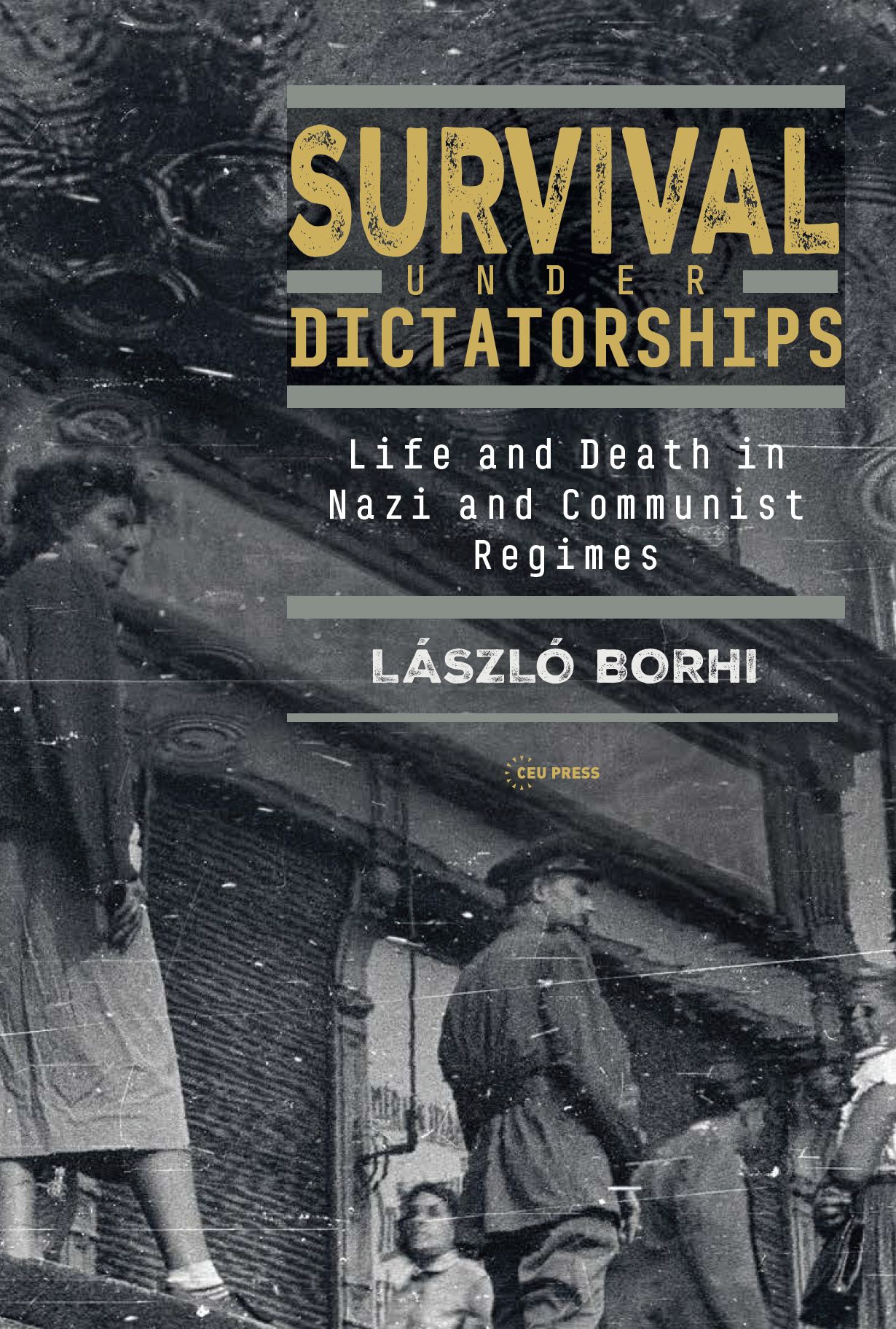Life and death under Hungarian dictatorships

Published by: CEU Press

On the first page of Survival Under Dictatorships: Life and Death in Nazi and Communist Regimes, László Borhi sets out the central tenet of his book: the “biological and spiritual” (p. 1) notion of survival. This description fits Borhi’s forensic and, if not theological, moral, analysis of the human instinct to survive. By analysing the Nazi and Stalinist dictatorships, Borhi also invites the reader to ask whether the difference between dictatorships necessitates a difference in the methods of survival; a consideration that recalls Ian Kershaw and Moshe Lewin’s seminal Stalinism and Nazism: Dictatorships in Comparison (1997). Though Borhi does not offer direct comparisons between the nature of survival under these two dictatorships, his chronological approach and focus on Hungary conveys the extent of suffering for those living in the country during the mid-twentieth century.
Borhi’s main argument is that not all of those who lived through Nazi and Stalinist terror descended into “the laws of the jungle” as there was also room “for angels” in what he terms “a Hobbesian struggle for survival” (p. 345). His examination of these dictatorships through the prism of testimonies from Hungarians who fought (whether honourably or not) to survive, makes this book an original contribution to scholarship on how Hungary’s political context impacted the lives of civilians from 1944 to 1953. As such it can be read alongside, scholarship by Cecil D. Eby (1998), Peter Kenez (2001; 2006), Sándor Horváth (2017), and Maya Nadkarni (2020).
testimonies of survival in the face of death from András Borhi and Mrs Ödön Nemes are some of the most compelling sections of the book as, above all, they capture how the will to survive at this time often superseded moral dilemmas.
Thanks to Borhi’s extensive archival research, the book provides readers with illuminating case studies that evidence the methods of both survival and subjugation. Reference to documents from, for example, the Historical Archives of the Hungarian State Security (ÁBTL), the National Committee for Attending Deportees (DGOB), and the Open Society Archives (OSA), allows Borhi to evaluate whether survival is an individual and/or collective endeavour, and to illustrate how the lines between collaborators and resisters, victims and perpetrators often became blurred (p. 170 and p. 275). He supports this position through detailed description of the actions of those involved in matters of survival in the book’s standout chapter: “Arrow Cross Terror” (pp. 133-245). Indeed, Borhi’s discussion of Amáta and Arzénia’s attempt to rescue 65 Jewish women and children in the Sisters of Divine Love convent (pp. 156-167), Oszkár Brunner (pp. 173-187) and his brother Tivadar’s (pp. 188-194) convoluted involvement with the Arrow Cross, and testimonies of survival in the face of death from András Borhi and Mrs Ödön Nemes (pp. 234-238) are some of the most compelling sections of the book as, above all, they capture how the will to survive at this time often superseded moral dilemmas.
This moral debate on the motivations behind acting rightly or wrongly underpins the book’s three parts. It comes to light in horrific detail in the first part “The Hungarian Holocaust” as Borhi draws on Auschwitz survivors’ testimonies of torture to suggest that “the irreparable psychological damage” of life at the concentration camps “more than anything else, forever ruined the lives of the survivors” (p. 78). It is revisited in the final part “Stalinism in Hungary” where Borhi applies a psychoanalytical methodology to his discussion about the legacy of the Communist regime. He describes a state of “social atomisation” (p. 313), where individuals remain isolated, fearful, and suspicious of each other, as responsible for fostering hate. To provide insights into the motives behind what he states is a choice to inflict harm and suffering, Borhi refers to Peter Gay’s (p. 195; p. 351) and Steven Pinker’s (p. 347; p. 353) work on sexual aggression and violence. His epigraph and concluding remarks also derive from the field of psychoanalysis as he cites Austrian Holocaust survivor and logotherapist, Viktor Frankl, who affirms that even in “terrible conditions of psychic and physical stress”, one has “a choice of action” (Frankl cited on page 345). In fact, Borhi’s strongest conviction aligns with Frankl’s in Man’s Search for Meaning: An Introduction to Logotherapy (1992) as Borhi claims that even under the harshest circumstances, human decency remains a viable choice. This stance is upheld by Hungarian Holocaust survivor Edith Eger in her memoir The Choice (2017), wherein Eger attributes her survival to Frankl’s notion of choice. As Borhi applies this theory of choice to not only the victim but also the perpetrator, personal and political factors impacting matters of survival risk being caught up in a binary framework that reduces the individual to acting either virtuously or contemptibly (a dichotomy Borhi argues against, as explained above).
Surprisingly Borhi also states that “there is no trace of survivor’s guilt” (p. 350) even though the term was coined by Dutch psychiatrist and Auschwitz survivor, Eddy de Wind in 1949, and explored in detail by Eger in The Choice. Survival Under Dictatorships is most effective when Borhi details the suffering that necessitates and results from these grim and compromising choices. Perhaps, therefore, the following quote by Frankl would better suit Borhi’s analysis of the extent and repercussions of suffering: “[i]f there is meaning in life at all, then there must be a meaning in suffering. Suffering is an ineradicable part of life, even as fate and death.”1
For researchers interested in Hungary’s history between 1944 and 1945, the book contains a wealth of archival evidence that detail the “forms of survival in the midst of barbarity” (p. 135). For those wanting to read about the Soviet “liberation” and Mátyás Rákosi’s subsequent regime, however, only 93 out of 360 pages of text are dedicated to this period. This is surprising given the focus of Borhi’s two other monographs: Hungary in the Cold War, 1945-1956: Between the United States and the Soviet Union (which came out in paperback this year) and Dealing with Dictators: The United States, Hungary, and East Central Europe 1942-1989. Indeed, Borhi only fleetingly mentions those who survived by illegally crossing the border (pp. 304-308), and, whereas archival references for the preceding parts are specific to the plight of Hungarian Jews, in “Stalinism in Hungary” archival sources from OSA tend to refer to Communism in Czechoslovakia (evident on pages 304, 308, 325, and 335).
Survival Under Dictatorships is most effective when Borhi details the suffering that necessitates and results from these grim and compromising choices.
For the general reader, though thematically Survival Under Dictatorships sits nicely alongside József Debreczeni’s Cold Crematorium: Reporting from the Land of Auschwitz (2023) and Matthew Longo’s The Picnic: An Escape to Freedom and the Collapse of the Iron Curtain (2024), Borhi’s academic style may seem challenging. Unlike Debreczeni’s and Longo’s accounts, Borhi’s monograph is aimed at academics with acute knowledge of Budapest and its environs. It does not contain any maps despite detailed reference to places in the Jewish Ghetto and Arrow Cross headquarters in several districts (including XIV, IX, and VI). Those unfamiliar with the modulations of Budapest’s politically determined urban design would benefit from illustrative maps in the front matter of the book, just as they appear in Debreczeni’s and Longo’s texts (a consideration for the paperback, perhaps).
Overall, though Survival Under Dictatorships is a well-researched contribution to scholarship in the fields of Holocaust and Communist studies, Borhi’s theoretical angle does not always align perfectly with his archive-directed discussions. Borhi’s epigraph to the Conclusion – a quote from Dylan Thomas’s 1933 poem “And death shall have no dominion” that reads “Though lovers be lost love shall not” – appears out of context. Whilst I cannot find any connection between the poet and Hungary, Thomas is widely regarded as Wales’s foremost bard; an epithet that recalls János Arany’s infamous poem “A walesi bárdok [The Bards of Wales]” (1857). Arany’s verse was intended to warn Franz Josef of the “fatal curse” that will likely befall any conqueror of Hungary, just as it did to King Edward I of England, who was plagued by guilt after he authorised the massacre of 500 “martyred bards of Wales” in 1277. Although Thomas’s poem loudly proclaims a sense of immortality in its exaggerated hwyl-like style, paradoxically, it belies an “innate ambiguity” over the Christian faith and an uneasiness concerning death.2 The impression, therefore, of “lost love” may not have been what Borhi intended for his concluding call for hope amidst suffering (p. 350). Perhaps a better epigraph would be something from Arany’s poem which defiantly depicts the protestations “of an ancient bard” who arose “like a white defenceless dove” against his oppressor. This would coincide with Frankl’s belief that the freedom to choose – that key ingredient needed to survive – cannot be taken away no matter how severe the dictatorship.
Lucy Jeffery is Co-Founder of the “Replaying Communism” research project which received AHRC funding in 2023. She has published widely on twentieth-century literature, theatre, and culture. Her monograph, Transdisciplinary Beckett: Visual Arts, Music, and the Creative Process was published in 2021, and she co-edited the “A New Poetics of Space” special issue of Green Letters in 2022. She has also published research on the political context of the mid-twentieth century faced by authors such as Magda Szabó. In 2024 she won the Visegrad Fellowship, and she is currently co-editing the forthcoming collection: Replaying Communism: Trauma and Nostalgia in European Media and Culture.
1 Viktor Frankl, Man’s Search for Meaning. 3rd ed. New York: Simon and Schuster, 1984, p. 88.
2 John Goodby, The Poetry of Dylan Thomas: Under the Spelling Wall. Liverpool: Liverpool University Press, 2013, p. 71.
